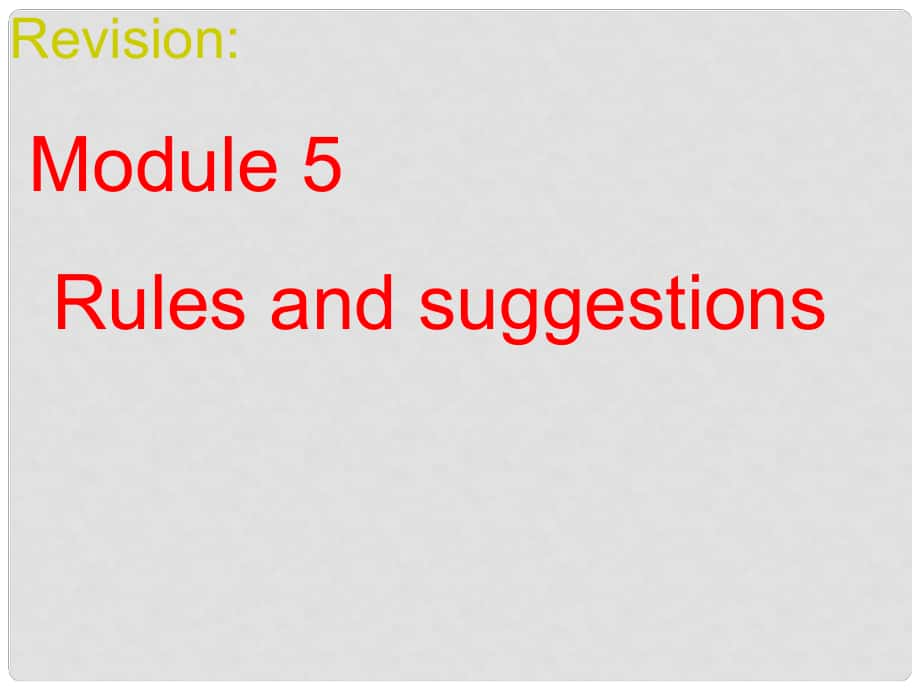《廣西靈山縣陸屋中學(xué)九年級(jí)英語(yǔ)下冊(cè) Module5《Rules and suggestions》課件 外研版》由會(huì)員分享���,可在線閱讀���,更多相關(guān)《廣西靈山縣陸屋中學(xué)九年級(jí)英語(yǔ)下冊(cè) Module5《Rules and suggestions》課件 外研版(26頁(yè)珍藏版)》請(qǐng)?jiān)谘b配圖網(wǎng)上搜索。
1���、Revision: Module 5 Rules and suggestionsYou mustnt park your car. shouldnt cant You can park your car. may must 123456情態(tài)動(dòng)詞本身有一定的含義���,但不能單獨(dú)作謂語(yǔ),后跟行為動(dòng)詞原形一起構(gòu)成謂語(yǔ)���,表示說(shuō)話人的語(yǔ)態(tài)和情態(tài)���。情態(tài)動(dòng)詞沒(méi)有人和數(shù)的變化���。can, could, may, might, shall, should, must, need, dare, ought to, will, would., used to.點(diǎn)撥: 此句中的could 表示委婉的語(yǔ)氣,而不是表示過(guò)去時(shí)態(tài)
2���、���。但回答時(shí)應(yīng)用can,表示能夠干某事���。1.- Could you cross the street here? - Of course you_ A. could B. can C. be able to D. willB2. Some people think trees _ on Tree Planting Day only. A. should be planted B. should plant C. should be planting D. be planted 點(diǎn)撥:表“義務(wù)”和“應(yīng)該”時(shí)���,用should。情態(tài)動(dòng)詞的被動(dòng)語(yǔ)態(tài)為:情態(tài)動(dòng)詞+ be +done���。A3.- Must I
3���、 do the work now? - No, you _ . You may do it later. A. cant B. mustnt C. neednt D. shouldnt c點(diǎn)撥:用must 引導(dǎo)的一般疑問(wèn)句,其回答形式:肯定回答用must���, 否定回答用neednt。4.You _ get there by bus. A. dont need B. neednt to C. dont need to D. need dont to .點(diǎn)撥:need既可以用作情態(tài)動(dòng)詞,又可以用作行為動(dòng)詞���,短語(yǔ)有need to do sth和need doing sth = need to be d
4���、one。c5. (08河南)-We won the English speaking contest. - Congratulations! You _ be very proud of it. A. can B. need C. would D. must6. She _ know the answer, but Im not sure.A. need B. may be C. may D. must7. That man _ be our English teacher. Because he has gone to Beijing. A. mustnt B. shouldnt C. ne
5���、ednt D. cant8.You _ swim in this part of the lake. Its dangerous. A. mustnt B. neednt C. may not D. wont 點(diǎn)撥:情態(tài)動(dòng)詞must ,may, might, can, could等都能表示“推測(cè)”���。它們的推測(cè)程度由強(qiáng)到弱的順序是:must, can, could, may, might. Must表示有把握的推測(cè),意思為“一定是���,肯定是”���,只用于肯定句, 表示對(duì)現(xiàn)在的推測(cè)���。否定形式則用cant���。 而mustnt 則表示“禁止”DCDA點(diǎn)撥:情態(tài)動(dòng)詞表”建議“或”邀請(qǐng)“多用would 和shou
6、ld���,常用的句式有:Would you like (love) (to)? 和Shall we?10._to have lunch with us today? A. Do you likes B. Would you like C. Will you liked D. Have you liked9. -_ we go to the park on Sunday? - Good idea! A. Would B. Shall C. Must D. NeedBBthe Great Walla bear1. Could you please give us a lot of rules and
7���、suggestions about visiting the Great Wall?1)You must keep to the path. You mustnt walk along the edge because you might fall and hurt yourself. 2)You have to keep together. You mustnt go off on your own, because you might get lost. 3)You shouldnt drink all your water, because your may need some late
8���、r.4)You can go rock climbing, but you must use ropes. 5) You have to think about your personal safety. You must have the right shoes.沿著小路走沿著小路走獨(dú)自離開(kāi)獨(dú)自離開(kāi)去攀巖去攀巖個(gè)人安全個(gè)人安全Answer the following questions according to the dialogue and the text of Module 5.2.What should (must) you do if there are bears near?
9、1) You must hang food in a tree.2) must/should pick up the rubbish.3) must /should keep a clean camp site.4) cant leave anything which bears might think is food.5) should make a lot of noise.6) mustnt move or make any gesture.7) .mustnt run because no one can run faster in the forest than a bear.han
10���、g 懸掛懸掛(過(guò)去式和過(guò)去分詞過(guò)去式和過(guò)去分詞hung, hung)���; 吊死(過(guò)去式和過(guò)去分詞吊死(過(guò)去式和過(guò)去分詞hanged, hanged)At last the two pictures were hung side by side. The murderer was hanged this morning.保持野營(yíng)地點(diǎn)整潔保持野營(yíng)地點(diǎn)整潔做個(gè)手勢(shì)做個(gè)手勢(shì)3. Retell the story with the following phrases. The beginning has been given. The third day, I went for a walk in the
11、 forest. Suddenly sawplaying with, reached out for sb/sth, turn ones head, looked up, stayed in the same position, have never runback to, my blood went cold.伸手接觸或取某物 Work in groups. You may choose one place of interest and write some advice for visitors to China. (at least five pieces of advice) (On
12���、e student write. The other student tell him or her some suggestions.) Welcome to . is in. It is a . And there are many beautiful place of interest. For example. They . But there are some danger. You must/cant/need/ can/should . Wish you have a good time.Model:提示詞:濕地(wetland)���,自然資源(nature resource),對(duì)蝦
13���、(prawns)���,自然保護(hù)區(qū)(nature resource protection areas),生態(tài)系統(tǒng)(ecological system)���,提示詞:Bird net 鳥(niǎo)巢���, water cube 水立方, the Summer Place 頤和園,紫禁城 the Forbidden City瀑布wall fall���,人間仙境fairyland in human, 天然景色scenery, 海拔height人文景觀human landscape,海岸線coast line���,椰子樹(shù)coconut tree。Warm suggestions:1.1.掌握所讀材料的主旨和大意���。掌握所讀材料的主旨和大意���。 2.2.把握文章的事實(shí)和細(xì)節(jié)。把握文章的事實(shí)和細(xì)節(jié)���。3.3.根據(jù)上下文猜測(cè)生詞的含義���。根據(jù)上下文猜測(cè)生詞的含義。4.4.邊讀邊劃出文章中的重點(diǎn)信息���。邊讀邊劃出文章中的重點(diǎn)信息���。5.5.判斷對(duì)錯(cuò)時(shí)���,在文章中標(biāo)出出處。判斷對(duì)錯(cuò)時(shí)���,在文章中標(biāo)出出處���。 The answers:F T F F FF T T F F
 廣西靈山縣陸屋中學(xué)九年級(jí)英語(yǔ)下冊(cè) Module5《Rules and suggestions》課件 外研版
廣西靈山縣陸屋中學(xué)九年級(jí)英語(yǔ)下冊(cè) Module5《Rules and suggestions》課件 外研版

